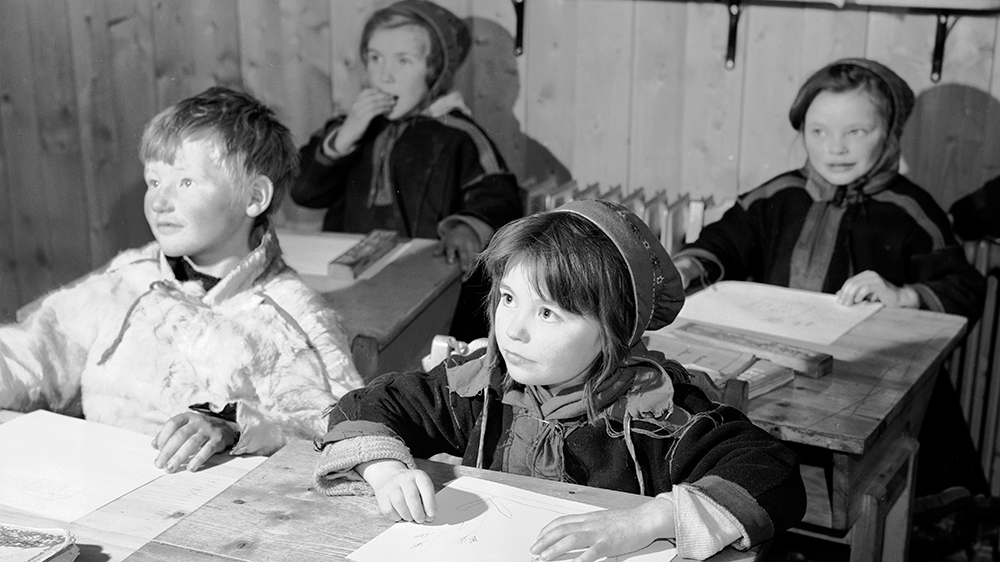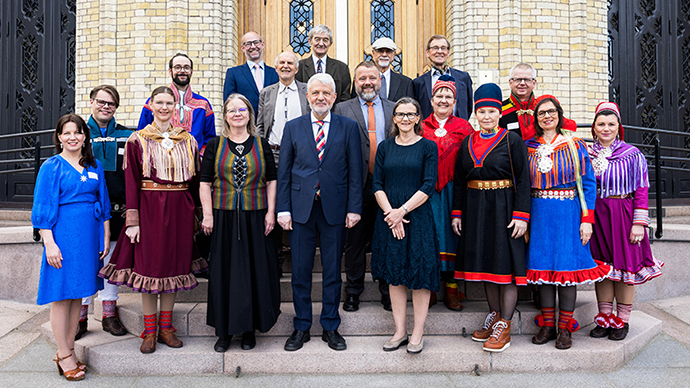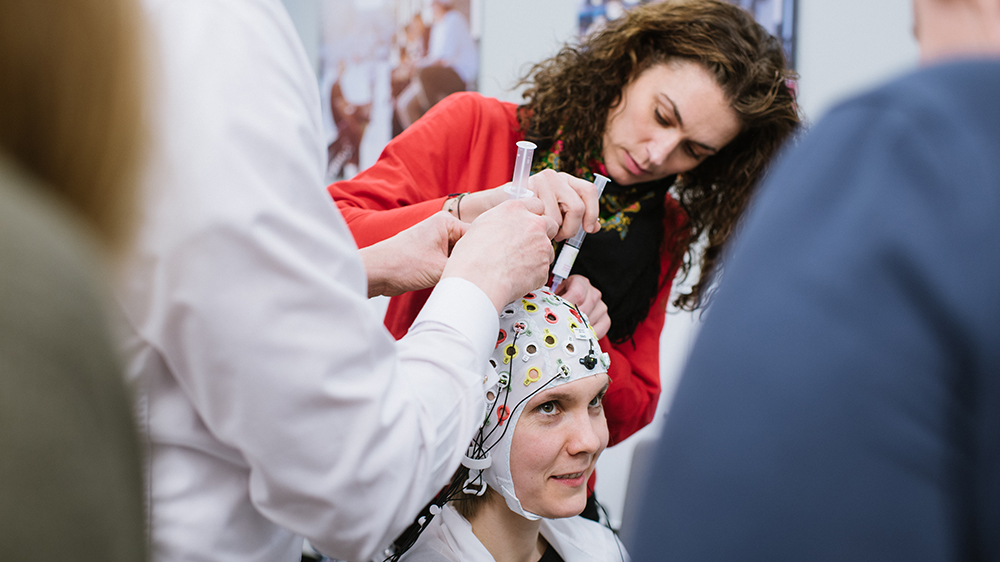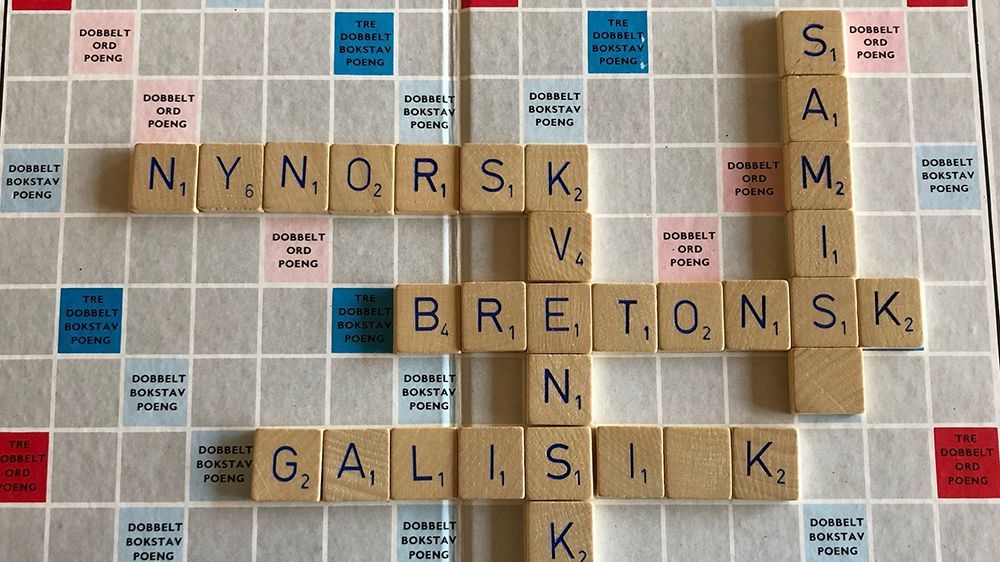Many Sámi, Kvens and Forest Finns experience grief over not mastering the language that ties them to their own people. An increasing number are now trying to reclaim their language.

NORWEGIANIZATION: From the 1850s to the 1960s, Norway pursued a targeted Norwegianization policy aimed at indigenous peoples and national minorities. Their language and culture were to be undermined and replaced by Norwegian language and culture. The photo shows Sami children at a boarding school in Karasjok in 1950. The instruction was in Norwegian. Photo: Sv. A. Børretzen via NTB.
"Many mourn the language they did not get to learn, but they also feel that they should be able to speak it, because indigenous and minority languages are so closely tied to their history. Many are also afraid of being corrected by those who speak the language fluently," says linguist Pia Lane.
Lane was one of the members of the Truth and Reconciliation Commission that presented its report to the Norwegian Parliament in 2023. The commission's mandate was to investigate the consequences of the assimilation policies on the Sámi, Kvens, and Forest Finns.
The report highlights, among other things, the importance of language as an identity marker and cultural bearer. Part of the mandate was to bring personal experiences and stories to light, and several of the young people who shared their stories used the term "language grief".
"Many adults and young people experience language grief, which means a longing for a language they never got to learn, and the desire for a language they can identify with and that connects them to their family," the report states.
But things are changing now, Lane explains.
"Many are learning Sámi or Kven and starting to actively use the languages at home."
She also believes that it has a strong signalling effect that it was the country's highest political body, the Storting, that commissioned the report.
"Those of us who were members of the commission now experience that we are being invited by state administrators and organisations to speak about the report. Much is already in place in the legislation, for example the right to language education, but it doesn't always seem to work in practice. If state administrators understand that this is important, there is hope for change."

"Their mother tongue was worthless"
Pia Lane has Kven and Sámi background and grew up with parents who were both Kvens, but never spoke Kven to her. She understood much, but did not speak a word of Kven until she was 14 years old. Only in adulthood did she decide to reclaim the language.
Her mother has said that they did what they believed was best for her. As a part of her doctoral thesis, Lane travelled to her hometown Bugøynes and interviewed people from the same generation as her parents. She found that many had the same belief.
"They told me that it was shameful to speak Kven at school. Therefore, they tried to speak Norwegian to their children as well as they could."
But their Norwegian was not "correct" Norwegian, and in encounters with official institutions, such as the educational system, many experienced a kind of double shame," she elaborates.
"Their mother tongue was worthless, and the only thing they could do was try to replace it with a language they did not master."
A continued silence
The assimilation policy extends far into the past. From around 1850 onwards, the Norwegian state's goal was to make the Sámi and Kvens Norwegian-speaking. Guidelines were provided for schools, allowing Kven and Sámi to be used as support languages only when absolutely necessary.
This was the official Norwegian policy until 1959 when the government allowed teaching to be conducted in Sámi. However, it took many years before this became official practice.
In the book chapter "The South in the North: Colonisation and Decolonisation of the Mind" from 2023, Lane discusses how the experience of being silenced can lead to an understanding of oneself and the world, which is then passed on to one's children, despite the assimilation policy no longer being officially in place.
Here, she sees parallels between the colonisation of southern countries and the policies that have been implemented towards the Sámi and Kvens in Norway. This was a perspective encouraged by her South African research partners.
A trauma that is reawakened
"In my work, I experienced that the theories I had took me to a certain point, but I couldn't explain how indigenous peoples had adopted different worldviews and made them their own. I also couldn't explain why these worldviews resurface when we try to reclaim what we have lost," Lane explains.
Foreign colleagues referred to it as the scar of colonisation.
"It's about a trauma or pain that has been inflicted on us, which can be awakened during revitalisation processes."
Today, "decolonisation" is a term Lane often uses in her research. For one thing, the Norwegian state built boarding schools for Kven and Sámi children and controlled access to land in the north.
Another aspect was that the state's mindset became ingrained in the minds of the people. "The most influential colonisation was of the mind, of language and the way we can think," Lane previously stated to the research magazine Apollon (norwegian).
-690x388.jpg)
Struggled to understand her own reactions
When she decided to learn Kven in adulthood, she spoke both English and French fluently.
"It was different to start speaking Kven. I felt vulnerable and unsure. There was much that I did not understand about my own reactions."
For now, she cannot fully explain why it was like that.
"But I think it had to do with the scar from colonisation. My grandparents and parents grew up with a mainstream society that did not acknowledge the value of Kven and Sámi culture. A large part of who they were was silenced and made invisible. This is a kind of silent pain that can be awakened again."
Today, this is exactly what Lane is researching: In the project Indigenous language resilience: From learners to speakers, she and her colleagues are investigating language revitalisation: They ask why, and in what ways, some people transition from learning a language to becoming active language users over time.
Awarded for her research
Earlier this year, it was announced that Lane will be awarded the prestigious The Fridtjof Nansen award for outstanding research. The prize is awarded to researchers who have made scientific contributions of international significance at a very high level.
The committee's recommendation states:
"Lane's research is internationally recognised and has a significant research impact in the field. In addition, her research has great practical and political importance. We want to highlight her contribution as a central member of the Truth and Reconciliation Commission".
When she received the call that she would be awarded the prize, Lane initially thought they would ask her to be part of the committee. Instead, the prestigious award was intended for her.
"It took a long time before I was able to digest it. It was so overwhelming."
The medal she is receiving is approved by His Majesty The King as an official Norwegian decoration (norwegian).
"My most important contribution is that I have been involved in putting indigenous languages and minority languages on the national and international agenda. I have been in the field for 25 years. But one does not do such work alone. This is work I have done together with colleagues," says Lane.
About Pia Lane and her research
Pia Lane is a Professor of Multilingualism at MultiLing - Centre for Multilingualism in Society Across the Lifespan at the University of Oslo and Academic Chair for the Circle U. Multilingualism, Interculturality and Language Lab.
She has investigated multilingualism from a range of theoretical perspectives, primarily drawing on data from Kven and Sámi communities in Northern Norway. Currently, her main research focus is language revitalisation, language policy and and minority language standardization
Lane served as a member of the Norwegian Truth and Reconciliation Commission, a parliamentary commission of inquiry, whose task was to investigate the Norwegianisation policy and injustice against the Sámi and Kvens/Norwegian Finns and propose measures for future reconciliation. The commission delivered its report to the Norwegian Parliament in June 2023.









